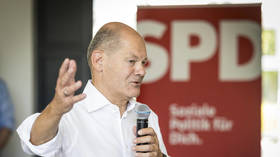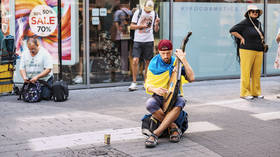German chancellor tells Ukrainians to start working

German Chancellor Olaf Scholz has urged Ukrainian refugees in the country to more actively seek employment. He also called on officials to cut red tape and on employers to take on more Ukrainian nationals.
The Berlin government has been criticized over special treatment given to Ukrainian refugees, allowing them – unlike asylum claimants from other countries – to receive the Burgergeld, or citizen’s allowance. The social benefit is typically reserved for low-income Germans or EU nationals living in the country.
The conservative CDU and its Bavarian sister party, the Christian Social Union (CSU), have argued that the generous handouts serve to discourage Ukrainians from looking for work.
More than a million Ukrainian refugees were estimated to be living in Germany as of July 2024.
Speaking at an event organized by the Social Democratic Party (SPD) in his constituency in Teltow on Saturday, Scholz said that even though a special government program has brought the number of employed Ukrainians to 200,000, “there are another couple of hundred thousand” who are still unemployed.
“So, it is my wish that [Ukrainians] work,” the chancellor said.
The German leader conceded that many Ukrainian refugees will not be able to immediately land a job in line with their qualifications, or will have to settle for part-time employment at first, but stressed that such factors should not discourage them from seeking jobs.
He also expressed incredulity that out of 2,000 Ukrainian doctors who have tried to find roles in the German healthcare system, only 120 have managed to secure a work permit.
The chancellor urged employers to “take a look at the people,” adding that required certificates can be obtained at a later date.
In addition, Scholz called on regional authorities to reduce the number of offices with overlapping functions that assess foreigners’ professional qualifications.
In July, CSU leader Markus Soder, who is also the head of the state of Bavaria, told the media that should a conservative government come to power on the federal level, it will stop paying the citizen’s allowance to Ukrainian refugees
A month prior, the chairman of the CSU parliamentary group in the Bundestag, Alexander Dobrindt, told Bild that “more than two years after the start of the war, the principle must now apply: take up work in Germany or return to safe areas of western Ukraine.”
Bild reported earlier this year that the employment rate among Ukrainian refugees in Germany stood at only 25%, the lowest figure among host nations.













